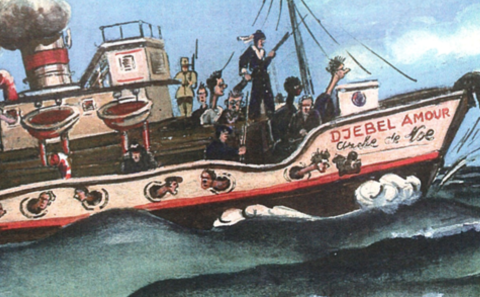POSTPONED | Undesirables: Forced Mobilities in Mediterranean Bande Dessinée Seminar

- Time:
- 18:00
- Date:
- 31 October 2023
- Venue:
- Online via Zoom
For more information regarding this seminar, please email parkes@soton.ac.uk .
Event details
This event is part of the Parkes Institute's 23/24 Event and Seminar Programme.
26/10/23: Please note that this event has been postponed. We will update this page as soon as the event is rescheduled.
Does a Mediterranean bande dessinée exist? This talk will contend that a well-established genre of Mediterranean comics and bande dessinée have been created and developed by artists and authors from around the Mediterranean Sea for decades. These comics inform our understanding of the historical and social dynamics of the Mediterranean social, cultural and political zone. They offer an artistic way to explore and grapple with the complex legacies of conflict, colonialism, and nationalism as well as the opportunities and challenges of contemporary life in the region. In this talk, I propose reading Mediterranean waterscapes and geographic landscapes through comics of colonial conscripts (Senegalese tirailleurs and Moroccan goumiers), WWII refugees, and today’s migrants. I coin Mediterranean bande dessinée of mobility and migration (MED-BDM) as a reference to a natural multinational artistic project with an educational orientation to evaluate colonial pasts and postcolonial relations between both sides of the Mediterranean landscapes. MED-BD has the capacity to challenge deceptive unrepresentative photographic reportage and journalistic writing and humanize internees and refugees of WWII in North Africa and today's migrants in Europe. The MED-BD has developed into a repository of visual stories that challenge Orientalist and pictorial archives of European painters, travelers, ethnologists and photographers about southern Mediterranean landscapes.
This event is co-organised with Winchester School of Art and is part of the University of Southampton's Black History Month programme.
About the Speaker
A historical anthropologist, Aomar Boum is Professor and Maurice Amado Chair in Sephardic Studies in the Department of Anthropology, Department of History and Department of Near Eastern Languages and Cultures at the University of California, Los Angeles. Co-founder and co-editor of Tamazgha Studies Journal, Boum is interested in the place of religious and ethnic minorities such as Jews, Baha’is, Shi'a, Amazigh, and Christians in post-independence Middle Eastern and North African nation states. A native of a Saharan community in southeastern Morocco, Boum has interdisciplinary training in anthropology, history, Middle Eastern and North African studies, and Judaic Studies. Co-founder and co-director of Moroccan Jewish Studies Program at UCLA, his work is focused on diverse aspects of North African Jewish-Muslim relations, and specifically on the way in which social interactions between these two communities have been understood in the historical center (Middle East) and in the periphery (Sub-Saharan and North Africa). In addition to Memories of Absence: How Muslims Remember Jews in Morocco (2013), Boum is co-editor of The Holocaust and North Africa (2019) and Wartime North Africa: A Documentary history, 1934-1950 (Stanford University Press, 2022) as well as author with artist Nadjib Berber of the graphic history: Undesirables: A Holocaust Journey to North Africa (Stanford University Press, 2023). Boum is a member of the Academic Committee of the United States Holocaust Memorial Museum and a Faculty Fellow at Université Internationale de Rabat, Morocco. Website: https://www.aomarboum.com/.
Cover Picture: Deportation of political (non)-Jewish prisoners in Cargo Holds herd Djbel Amour to the Camp of Djelfa, 22 March 1941.